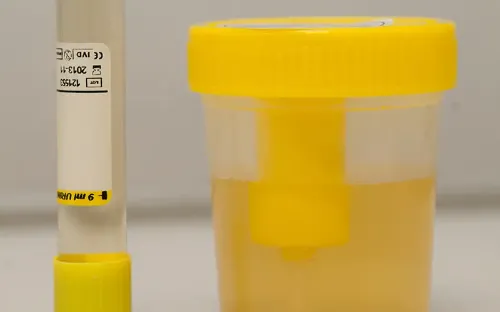Acute kidney failure
"If any of these symptoms are present, it is essential to see a specialist for early evaluation and timely treatment."
DR. NURIA GARCÍA
DIRECTOR. NEPHROLOGY DEPARTMENT

Acute kidney failure or acute kidney injury is a sudden loss of kidney function that occurs within hours or days, affecting the kidney’s ability to remove toxins and maintain fluid and electrolyte balance. It is a medical emergency that requires prompt diagnosis and management to prevent irreversible kidney damage.
The main causes of acute kidney injury include states of renal hypoperfusion (dehydration, shock, heart failure), exposure to nephrotoxic substances (certain antibiotics, anti-inflammatory drugs, and radiologic contrast agents), urinary tract obstruction, and acute glomerular diseases.
Although it is often reversible, the severity can vary and may require temporary renal replacement therapy.

What are the symptoms of acute kidney failure?
It can be manifested by an alteration in the analysis, producing an increase in the levels of creatinine and urea, or by the appearance of certain symptoms such as a reduction in the volume of urine that can be accompanied by changes in appearance (dark, concentrated or bloody urine).
This reduction in volume can lead to the absence of urine or anuria. Due to this decrease in urine volume, if there is an uncontrolled entry of liquids, water retention occurs, leading to the appearance of edema or even cardiorespiratory overload that triggers.
Uremic syndrome: This is the main consequence of renal failure. It produces an accumulation of uremic toxins that produce alterations in various systems.
It is capable of provoking a gastritis with loss of appetite and disorders in the intestinal rhythm. It produces anemia caused by a decrease in the formation of red blood cells, as well as an increase in losses, even by some facility for bleeding.
A certain immunodeficiency is caused, which facilitates the appearance of infections. There are hormonal changes such as certain hypothyroidism.
The most common symptoms are:
- Edemas.
- Uremic syndrome.
- Decrease in the amount of urine. Anuria.
Among the most affected systems is the neurological with development of a neuropathy and especially progressive metabolic encephalopathy with impaired cognitive ability that in severe cases leads to coma.
Of course, the appearance of all these symptoms will depend on the patient's basal state, age and nutritional status, as well as the presence of other organ failures.
Do you have any of these symptoms?
If you suspect that you have any of the above symptoms,
you should consult a medical specialist for a diagnosis.
What are the causes of acute kidney failure?
It may be caused by various factors that affect glomerular filtration:
- Reduced blood flow to the kidney: due to low blood pressure or hypovolemia (caused by bleeding, dehydration, or poor blood volume distribution in conditions such as sepsis, ascites, or intestinal obstruction).
- Direct damage to kidney tissue: caused by diseases such as glomerulonephritis or by the toxicity of certain medications, including intravenous contrast agents.
- Obstruction of urinary flow: resulting from conditions such as prostatic hyperplasia or compression of the ureters by masses or lymph nodes.
What are the risk factors?
There are several factors that may predispose an individual to the development of this condition:
- Diabetes and high blood pressure
- Preexisting kidney and liver diseases
- Immunological disorders
- Chronic infections
- Prostatic hypertrophy and bladder obstruction
- Advanced age
How is acute kidney failure diagnosed?

Because acute kidney failure is often a complication of other serious diseases, sometimes signs and symptoms may go unnoticed or be attributed to the underlying disease.
When this condition is suspected, blood and urine tests should be performed. The alterations that can appear are: diminution of the volume of urine (less than 500 milliliters), increase in blood of the urea and creatinine and elevated electrolytes like the potassium.
It is usually necessary to perform an abdominal ultrasound and sometimes even a kidney biopsy to determine the cause of acute kidney failure.
How is acute kidney failure treated?
Treatment begins by addressing the underlying cause of kidney failure. This is clearly seen in cases of dehydration or low blood pressure, where fluid replacement is necessary, or when there is an obstruction, which can be relieved with a catheter or nephrostomy to restore urine flow.
When significant kidney damage has occurred and recovery does not follow stabilization of the patient, it is essential to closely monitor vital signs, manage fluid balance to prevent overload, and adjust or discontinue medications that could negatively affect kidney function.
In certain cases, diuretics may be used to increase urine output, or it may be necessary to replace kidney function using dialysis techniques.
Where do we treat it?
IN NAVARRE AND MADRID
The Nephrology Service
of the Clínica Universidad de Navarra
The Nephrology Service of the Clínica Universidad de Navarra has more than five decades of experience, both in the diagnosis and treatment of all kidney pathologies and in the transplant of this organ.
Our specialists have completed their training in centers of national and international reference.
We have the best facilities in the Dialysis Unit in order to offer the highest quality care to our patients.

Why at the Clinica?
- National reference in kidney transplantation, pioneer in living donor kidney transplantation.
- Specialized nursing for the care and follow-up of our patients.
- Cardiovascular and renal damage prevention program.









